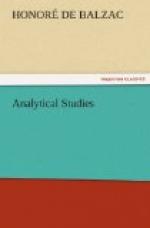grew to perfection, unfostered, in the fields of thought.
Each phase of the work which had been condemned by
others took root and gathered strength, surviving
like the slight branch of a tree which, flung upon
the sand by a winter’s storm, finds itself covered
at morning with white and fantastic icicles, produced
by the caprices of nightly frosts. So the sketch
lived on and became the starting point of myriad branching
moralizations. It was like a polypus which multiplies
itself by generation. The feelings of youth,
the observations which a favorable opportunity led
him to make, were verified in the most trifling events
of his after life. Soon this mass of ideas became
harmonized, took life, seemed, as it were, to become
a living individual and moved in the midst of those
domains of fancy, where the soul loves to give full
rein to its wild creations. Amid all the distractions
of the world and of life, the author always heard a
voice ringing in his ears and mockingly revealing the
secrets of things at the very moment he was watching
a woman as she danced, smiled, or talked. Just
as Mephistopheles pointed out to Faust in that terrific
assemblage at the Brocken, faces full of frightful
augury, so the author was conscious in the midst of
the ball of a demon who would strike him on the shoulder
with a familiar air and say to him: “Do
you notice that enchanting smile? It is a grin
of hatred.” And then the demon would strut
about like one of the captains in the old comedies
of Hardy. He would twitch the folds of a lace
mantle and endeavor to make new the fretted tinsel
and spangles of its former glory. And then like
Rabelais he would burst into loud and unrestrainable
laughter, and would trace on the street-wall a word
which might serve as a pendant to the “Drink!”
which was the only oracle obtainable from the heavenly
bottle. This literary Trilby would often appear
seated on piles of books, and with hooked fingers
would point out with a grin of malice two yellow volumes
whose title dazzled the eyes. Then when he saw
he had attracted the author’s attention he spelt
out, in a voice alluring as the tones of an harmonica,
Physiology of Marriage! But, almost always
he appeared at night during my dreams, gentle as some
fairy guardian; he tried by words of sweetness to subdue
the soul which he would appropriate to himself.
While he attracted, he also scoffed at me; supple
as a woman’s mind, cruel as a tiger, his friendliness
was more formidable than his hatred, for he never yielded
a caress without also inflicting a wound. One
night in particular he exhausted the resources of
his sorceries, and crowned all by a last effort.
He came, he sat on the edge of the bed like a young
maiden full of love, who at first keeps silence but
whose eyes sparkle, until at last her secret escapes
her.
“This,” said he, “is a prospectus of a new life-buoy, by means of which one can pass over the Seine dry-footed. This other pamphlet is the report of the Institute on a garment by wearing which we can pass through flames without being burnt. Have you no scheme which can preserve marriage from the miseries of excessive cold and excessive heat? Listen to me! Here we have a book on the Art of preserving foods; on the Art of curing smoky chimneys; on the Art of making good mortar; on the Art of tying a cravat; on the Art of carving meat.”




